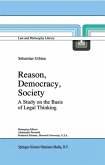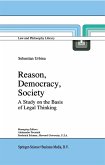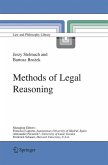Eric Engle
Post Positivism
Eric Engle
Post Positivism
- Broschiertes Buch
- Merkliste
- Auf die Merkliste
- Bewerten Bewerten
- Teilen
- Produkt teilen
- Produkterinnerung
- Produkterinnerung
Post-positivism presents a materialist, holist, monist, cognitivist theory of law and justice. It argues that positivism and natural law are complementary and that the normative syllogism can be logically valid if its implicit presumptions are rendered explicit and its normative statements are recast as logical conditionals. Laws are logical conditionals. Logic has two branches, theoretical rationality and practical reasoning. Binary logic is inadequate to accurately describe law as seen in several logical paradoxes that are avoided by using multivariate logic.
Andere Kunden interessierten sich auch für
![Der Einfluß des naturwissenschaftlichen, philosophischen und historischen Positivismus auf die deutsche Rechtslehre im 19. Jahrhundert. Der Einfluß des naturwissenschaftlichen, philosophischen und historischen Positivismus auf die deutsche Rechtslehre im 19. Jahrhundert.]() Dietrich TrippDer Einfluß des naturwissenschaftlichen, philosophischen und historischen Positivismus auf die deutsche Rechtslehre im 19. Jahrhundert.74,90 €
Dietrich TrippDer Einfluß des naturwissenschaftlichen, philosophischen und historischen Positivismus auf die deutsche Rechtslehre im 19. Jahrhundert.74,90 €![Rechts- und Staatsphilosophie Rechts- und Staatsphilosophie]() R. GröschnerRechts- und Staatsphilosophie25,99 €
R. GröschnerRechts- und Staatsphilosophie25,99 €![Adam Smith als Rechtstheoretiker Adam Smith als Rechtstheoretiker]() Jens PetersenAdam Smith als Rechtstheoretiker69,95 €
Jens PetersenAdam Smith als Rechtstheoretiker69,95 €![Adam Smith als Rechtstheoretiker Adam Smith als Rechtstheoretiker]() Jens PetersenAdam Smith als Rechtstheoretiker84,95 €
Jens PetersenAdam Smith als Rechtstheoretiker84,95 €![Reason, Democracy, Society Reason, Democracy, Society]() Sebastián UrbinaReason, Democracy, Society83,99 €
Sebastián UrbinaReason, Democracy, Society83,99 €![Reason, Democracy, Society Reason, Democracy, Society]() Sebastián UrbinaReason, Democracy, Society125,99 €
Sebastián UrbinaReason, Democracy, Society125,99 €![Methods of Legal Reasoning Methods of Legal Reasoning]() Jerzy StelmachMethods of Legal Reasoning110,99 €
Jerzy StelmachMethods of Legal Reasoning110,99 €-
-
-
Post-positivism presents a materialist, holist, monist, cognitivist theory of law and justice. It argues that positivism and natural law are complementary and that the normative syllogism can be logically valid if its implicit presumptions are rendered explicit and its normative statements are recast as logical conditionals. Laws are logical conditionals. Logic has two branches, theoretical rationality and practical reasoning. Binary logic is inadequate to accurately describe law as seen in several logical paradoxes that are avoided by using multivariate logic.
Produktdetails
- Produktdetails
- Schriften zur Rechtstheorie 270
- Verlag: Duncker & Humblot
- Artikelnr. des Verlages: 13987
- Seitenzahl: 478
- Erscheinungstermin: 18. Februar 2014
- Englisch
- Abmessung: 224mm x 146mm x 23mm
- Gewicht: 700g
- ISBN-13: 9783428139873
- ISBN-10: 3428139879
- Artikelnr.: 40424384
- Herstellerkennzeichnung Die Herstellerinformationen sind derzeit nicht verfügbar.
- Schriften zur Rechtstheorie 270
- Verlag: Duncker & Humblot
- Artikelnr. des Verlages: 13987
- Seitenzahl: 478
- Erscheinungstermin: 18. Februar 2014
- Englisch
- Abmessung: 224mm x 146mm x 23mm
- Gewicht: 700g
- ISBN-13: 9783428139873
- ISBN-10: 3428139879
- Artikelnr.: 40424384
- Herstellerkennzeichnung Die Herstellerinformationen sind derzeit nicht verfügbar.
Eric Engle (JD, St. Louis, DEA, Paris, LL.M. Dr. Jur. Bremen) currently teaches law at Humboldt University of Berlin. He has taught law in France, Germany, Estonia, and Russia. He speaks English, French, and German fluently, and also speaks Spanish, Russian, and Estonian. He has published several dozen law review articles.
1. Method: Ontology, Epistemology, Axiology
2. Legal Theory in Antiquity: Aristotle
3. Pre Modern Theory: Medieval Scholasticism and the Universals (1400-1600)
4. Into Modernity: Natural Law and Normative Inference
Introduction: The Contemporary View - The False Dichotomy of Either Positivism or Natural Law but not Both - Normative Inferencing
5. Modernity: Social Contract and Natural Law
Natural Rights - Social Contract Theory - Contemporary Social Contract Theorists - Libertarians - Criticisms of the Social Contract - Conclusion: Explaining the Success of the Theory of Social Contract Theory
6. Late Modernity: Legal Realism
Introduction - The Judicial "Revolution" - Post War: Co-opting Radicalism to Serve Global Hegemony - Conclusion
7. Beyond legal Realism (1950-1980)
Introduction: The Failure of the Left - Epistemological Basis of Realist Legal method - Axiological Basis of Realist Legal Method. Hume and Kelsen - Legal Method - Conclusion: Beyond Legal Realism
8. Law and Economics (1980-?)
Introduction - The Origin of Contemporary L&E in Classical Economists - Law and Economics: Richard Posner - The Chicago School (Supply side Theory): Milton Friedman - The Vienna School - The School of Public Choice: James Buchanan - Conclusions
9. Kelsen
Normative Inference - Critique - Conclusion
10. After Modernity? Critical Legal Studies
The Origins of Critical Legal Studies: Legal Realism - Marxist Legal Theory - Critical Legal Studies - Post Modernism
11. Contemporary Legal Theory: Scientificity
Introduction - Scientificity of Law: How the Study of Law is Scientific - Language, Logic, and Law - A Critical Response to Duncan Kennedy's Theory of Argumentation - Pedagogy - Conclusion
12. Legal Indeterminacy and Autonomy of Law
Introduction - Truth - Logic - Conclusion: Law and Morality
13. Rights Discourse
14. The Right to Food
Global Conclusion
Bibliography, Table of Cases, Index1. Method: Ontology, Epistemology, Axiology
2. Legal Theory in Antiquity: Aristotle
3. Pre Modern Theory: Medieval Scholasticism and the Universals (1400-1600)
4. Into Modernity: Natural Law and Normative Inference
Introduction: The Contemporary View - The False Dichotomy of Either Positivism or Natural Law but not Both - Normative Inferencing
5. Modernity: Social Contract and Natural Law
Natural Rights - Social Contract Theory - Contemporary Social Contract Theorists - Libertarians - Criticisms of the Social Contract - Conclusion: Explaining the Success of the Theory of Social Contract Theory
6. Late Modernity: Legal Realism
Introduction - The Judicial »Revolution« - Post War: Co-opting Radicalism to Serve Global Hegemony - Conclusion
7. Beyond legal Realism (1950-1980)
Introduction: The Failure of the Left - Epistemological Basis of Realist Legal method - Axiological Basis of Realist Legal Method. Hume and Kelsen - Legal Method - Conclusion: Beyond Legal Realism
8. Law and Economics (1980-?)
Introduction - The Origin of Contemporary L&E in Classical Economists - Law and Economics: Richard Posner - The Chicago School (Supply side Theory): Milton Friedman - The Vienna School - The School of Public Choice: James Buchanan - Conclusions
9. Kelsen
Normative Inference - Critique - Conclusion
10. After Modernity? Critical Legal Studies
The Origins of Critical Legal Studies: Legal Realism - Marxist Legal Theory - Critical Legal Studies - Post Modernism
11. Contemporary Legal Theory: Scientificity
Introduction - Scientificity of Law: How the Study of Law is Scientific - Language, Logic, and Law - A Critical Response to Duncan Kennedy's Theory of Argumentation - Pedagogy - Conclusion
12. Legal Indeterminacy and Autonomy of Law
Introduction - Truth - Logic - Conclusion: Law and Morality
13. Rights Discourse
14. The Right to Food
Global Conclusion
Bibliography, Table of Cases, Index
2. Legal Theory in Antiquity: Aristotle
3. Pre Modern Theory: Medieval Scholasticism and the Universals (1400-1600)
4. Into Modernity: Natural Law and Normative Inference
Introduction: The Contemporary View - The False Dichotomy of Either Positivism or Natural Law but not Both - Normative Inferencing
5. Modernity: Social Contract and Natural Law
Natural Rights - Social Contract Theory - Contemporary Social Contract Theorists - Libertarians - Criticisms of the Social Contract - Conclusion: Explaining the Success of the Theory of Social Contract Theory
6. Late Modernity: Legal Realism
Introduction - The Judicial "Revolution" - Post War: Co-opting Radicalism to Serve Global Hegemony - Conclusion
7. Beyond legal Realism (1950-1980)
Introduction: The Failure of the Left - Epistemological Basis of Realist Legal method - Axiological Basis of Realist Legal Method. Hume and Kelsen - Legal Method - Conclusion: Beyond Legal Realism
8. Law and Economics (1980-?)
Introduction - The Origin of Contemporary L&E in Classical Economists - Law and Economics: Richard Posner - The Chicago School (Supply side Theory): Milton Friedman - The Vienna School - The School of Public Choice: James Buchanan - Conclusions
9. Kelsen
Normative Inference - Critique - Conclusion
10. After Modernity? Critical Legal Studies
The Origins of Critical Legal Studies: Legal Realism - Marxist Legal Theory - Critical Legal Studies - Post Modernism
11. Contemporary Legal Theory: Scientificity
Introduction - Scientificity of Law: How the Study of Law is Scientific - Language, Logic, and Law - A Critical Response to Duncan Kennedy's Theory of Argumentation - Pedagogy - Conclusion
12. Legal Indeterminacy and Autonomy of Law
Introduction - Truth - Logic - Conclusion: Law and Morality
13. Rights Discourse
14. The Right to Food
Global Conclusion
Bibliography, Table of Cases, Index1. Method: Ontology, Epistemology, Axiology
2. Legal Theory in Antiquity: Aristotle
3. Pre Modern Theory: Medieval Scholasticism and the Universals (1400-1600)
4. Into Modernity: Natural Law and Normative Inference
Introduction: The Contemporary View - The False Dichotomy of Either Positivism or Natural Law but not Both - Normative Inferencing
5. Modernity: Social Contract and Natural Law
Natural Rights - Social Contract Theory - Contemporary Social Contract Theorists - Libertarians - Criticisms of the Social Contract - Conclusion: Explaining the Success of the Theory of Social Contract Theory
6. Late Modernity: Legal Realism
Introduction - The Judicial »Revolution« - Post War: Co-opting Radicalism to Serve Global Hegemony - Conclusion
7. Beyond legal Realism (1950-1980)
Introduction: The Failure of the Left - Epistemological Basis of Realist Legal method - Axiological Basis of Realist Legal Method. Hume and Kelsen - Legal Method - Conclusion: Beyond Legal Realism
8. Law and Economics (1980-?)
Introduction - The Origin of Contemporary L&E in Classical Economists - Law and Economics: Richard Posner - The Chicago School (Supply side Theory): Milton Friedman - The Vienna School - The School of Public Choice: James Buchanan - Conclusions
9. Kelsen
Normative Inference - Critique - Conclusion
10. After Modernity? Critical Legal Studies
The Origins of Critical Legal Studies: Legal Realism - Marxist Legal Theory - Critical Legal Studies - Post Modernism
11. Contemporary Legal Theory: Scientificity
Introduction - Scientificity of Law: How the Study of Law is Scientific - Language, Logic, and Law - A Critical Response to Duncan Kennedy's Theory of Argumentation - Pedagogy - Conclusion
12. Legal Indeterminacy and Autonomy of Law
Introduction - Truth - Logic - Conclusion: Law and Morality
13. Rights Discourse
14. The Right to Food
Global Conclusion
Bibliography, Table of Cases, Index
1. Method: Ontology, Epistemology, Axiology
2. Legal Theory in Antiquity: Aristotle
3. Pre Modern Theory: Medieval Scholasticism and the Universals (1400-1600)
4. Into Modernity: Natural Law and Normative Inference
Introduction: The Contemporary View - The False Dichotomy of Either Positivism or Natural Law but not Both - Normative Inferencing
5. Modernity: Social Contract and Natural Law
Natural Rights - Social Contract Theory - Contemporary Social Contract Theorists - Libertarians - Criticisms of the Social Contract - Conclusion: Explaining the Success of the Theory of Social Contract Theory
6. Late Modernity: Legal Realism
Introduction - The Judicial "Revolution" - Post War: Co-opting Radicalism to Serve Global Hegemony - Conclusion
7. Beyond legal Realism (1950-1980)
Introduction: The Failure of the Left - Epistemological Basis of Realist Legal method - Axiological Basis of Realist Legal Method. Hume and Kelsen - Legal Method - Conclusion: Beyond Legal Realism
8. Law and Economics (1980-?)
Introduction - The Origin of Contemporary L&E in Classical Economists - Law and Economics: Richard Posner - The Chicago School (Supply side Theory): Milton Friedman - The Vienna School - The School of Public Choice: James Buchanan - Conclusions
9. Kelsen
Normative Inference - Critique - Conclusion
10. After Modernity? Critical Legal Studies
The Origins of Critical Legal Studies: Legal Realism - Marxist Legal Theory - Critical Legal Studies - Post Modernism
11. Contemporary Legal Theory: Scientificity
Introduction - Scientificity of Law: How the Study of Law is Scientific - Language, Logic, and Law - A Critical Response to Duncan Kennedy's Theory of Argumentation - Pedagogy - Conclusion
12. Legal Indeterminacy and Autonomy of Law
Introduction - Truth - Logic - Conclusion: Law and Morality
13. Rights Discourse
14. The Right to Food
Global Conclusion
Bibliography, Table of Cases, Index1. Method: Ontology, Epistemology, Axiology
2. Legal Theory in Antiquity: Aristotle
3. Pre Modern Theory: Medieval Scholasticism and the Universals (1400-1600)
4. Into Modernity: Natural Law and Normative Inference
Introduction: The Contemporary View - The False Dichotomy of Either Positivism or Natural Law but not Both - Normative Inferencing
5. Modernity: Social Contract and Natural Law
Natural Rights - Social Contract Theory - Contemporary Social Contract Theorists - Libertarians - Criticisms of the Social Contract - Conclusion: Explaining the Success of the Theory of Social Contract Theory
6. Late Modernity: Legal Realism
Introduction - The Judicial »Revolution« - Post War: Co-opting Radicalism to Serve Global Hegemony - Conclusion
7. Beyond legal Realism (1950-1980)
Introduction: The Failure of the Left - Epistemological Basis of Realist Legal method - Axiological Basis of Realist Legal Method. Hume and Kelsen - Legal Method - Conclusion: Beyond Legal Realism
8. Law and Economics (1980-?)
Introduction - The Origin of Contemporary L&E in Classical Economists - Law and Economics: Richard Posner - The Chicago School (Supply side Theory): Milton Friedman - The Vienna School - The School of Public Choice: James Buchanan - Conclusions
9. Kelsen
Normative Inference - Critique - Conclusion
10. After Modernity? Critical Legal Studies
The Origins of Critical Legal Studies: Legal Realism - Marxist Legal Theory - Critical Legal Studies - Post Modernism
11. Contemporary Legal Theory: Scientificity
Introduction - Scientificity of Law: How the Study of Law is Scientific - Language, Logic, and Law - A Critical Response to Duncan Kennedy's Theory of Argumentation - Pedagogy - Conclusion
12. Legal Indeterminacy and Autonomy of Law
Introduction - Truth - Logic - Conclusion: Law and Morality
13. Rights Discourse
14. The Right to Food
Global Conclusion
Bibliography, Table of Cases, Index
2. Legal Theory in Antiquity: Aristotle
3. Pre Modern Theory: Medieval Scholasticism and the Universals (1400-1600)
4. Into Modernity: Natural Law and Normative Inference
Introduction: The Contemporary View - The False Dichotomy of Either Positivism or Natural Law but not Both - Normative Inferencing
5. Modernity: Social Contract and Natural Law
Natural Rights - Social Contract Theory - Contemporary Social Contract Theorists - Libertarians - Criticisms of the Social Contract - Conclusion: Explaining the Success of the Theory of Social Contract Theory
6. Late Modernity: Legal Realism
Introduction - The Judicial "Revolution" - Post War: Co-opting Radicalism to Serve Global Hegemony - Conclusion
7. Beyond legal Realism (1950-1980)
Introduction: The Failure of the Left - Epistemological Basis of Realist Legal method - Axiological Basis of Realist Legal Method. Hume and Kelsen - Legal Method - Conclusion: Beyond Legal Realism
8. Law and Economics (1980-?)
Introduction - The Origin of Contemporary L&E in Classical Economists - Law and Economics: Richard Posner - The Chicago School (Supply side Theory): Milton Friedman - The Vienna School - The School of Public Choice: James Buchanan - Conclusions
9. Kelsen
Normative Inference - Critique - Conclusion
10. After Modernity? Critical Legal Studies
The Origins of Critical Legal Studies: Legal Realism - Marxist Legal Theory - Critical Legal Studies - Post Modernism
11. Contemporary Legal Theory: Scientificity
Introduction - Scientificity of Law: How the Study of Law is Scientific - Language, Logic, and Law - A Critical Response to Duncan Kennedy's Theory of Argumentation - Pedagogy - Conclusion
12. Legal Indeterminacy and Autonomy of Law
Introduction - Truth - Logic - Conclusion: Law and Morality
13. Rights Discourse
14. The Right to Food
Global Conclusion
Bibliography, Table of Cases, Index1. Method: Ontology, Epistemology, Axiology
2. Legal Theory in Antiquity: Aristotle
3. Pre Modern Theory: Medieval Scholasticism and the Universals (1400-1600)
4. Into Modernity: Natural Law and Normative Inference
Introduction: The Contemporary View - The False Dichotomy of Either Positivism or Natural Law but not Both - Normative Inferencing
5. Modernity: Social Contract and Natural Law
Natural Rights - Social Contract Theory - Contemporary Social Contract Theorists - Libertarians - Criticisms of the Social Contract - Conclusion: Explaining the Success of the Theory of Social Contract Theory
6. Late Modernity: Legal Realism
Introduction - The Judicial »Revolution« - Post War: Co-opting Radicalism to Serve Global Hegemony - Conclusion
7. Beyond legal Realism (1950-1980)
Introduction: The Failure of the Left - Epistemological Basis of Realist Legal method - Axiological Basis of Realist Legal Method. Hume and Kelsen - Legal Method - Conclusion: Beyond Legal Realism
8. Law and Economics (1980-?)
Introduction - The Origin of Contemporary L&E in Classical Economists - Law and Economics: Richard Posner - The Chicago School (Supply side Theory): Milton Friedman - The Vienna School - The School of Public Choice: James Buchanan - Conclusions
9. Kelsen
Normative Inference - Critique - Conclusion
10. After Modernity? Critical Legal Studies
The Origins of Critical Legal Studies: Legal Realism - Marxist Legal Theory - Critical Legal Studies - Post Modernism
11. Contemporary Legal Theory: Scientificity
Introduction - Scientificity of Law: How the Study of Law is Scientific - Language, Logic, and Law - A Critical Response to Duncan Kennedy's Theory of Argumentation - Pedagogy - Conclusion
12. Legal Indeterminacy and Autonomy of Law
Introduction - Truth - Logic - Conclusion: Law and Morality
13. Rights Discourse
14. The Right to Food
Global Conclusion
Bibliography, Table of Cases, Index








